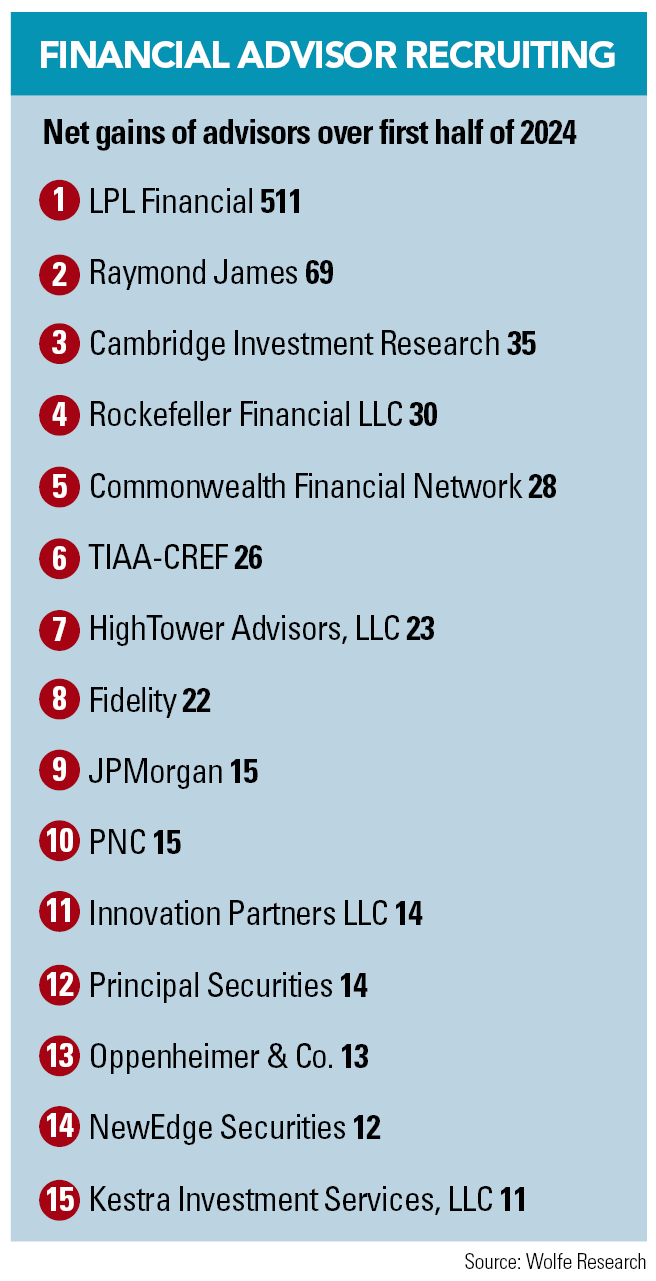

Giant branch offices, or those with billions in client assets, have been splitting away from their broker-dealers for years.
Just remember the commotion Ron Carson caused in 2016 when it became known the longtime LPL Financial star broker, whose firm at the time managed more than $7 billion in client assets, was jumping ship to rival Cetera Financial Group before eventually going fully independent as a registered investment advisor.
And when a multi-billion-dollar asset firm like Ron Carson’s becomes an independent RIA, that means it doesn’t have to split the revenue with its broker-dealer, a much more advantageous position financially to owners of such firms like Ron Carson.
Not all such breakups between superstars like Ron Carson, whose firm is currently facing a lawsuit that has raised questions about its corporate culture and the consequences of a brand being tied so strongly to one person, and their broker-dealers draw such attention.
But this summer has seen another round of notable splits of large branch offices, which work with dozens or hundreds of financial advisors, and the broker-dealers that offer trading, execution, compliance, and other services to the branch office.
Those include Merit Financial Advisors, a $12 billion hybrid registered investment advisor, which reportedly is breaking from LPL Financial, and Crux Wealth Advisors, whose CEO, Travis Alexander, was registered with Raymond James Financial Services before he opened the RIA in August.
It’s an indication that perhaps now, more than ever, the executives and financial advisors who sit atop and own the branch offices, some of them large enough to be broker-dealers themselves, are flexing the financial muscle and enjoying the potential fruits of investors like private equity funds flooding the industry with cash as they continue to invest in wealth management companies.
A spokesperson for Merit Financial Advisors declined to comment. Like other breakaway branch offices, Crux Wealth Advisors is looking to grow and add advisors for offices around the country.
 The financial advisor at the top of the branch, the Ron Carson of the group, if you will, has enormous influence in such branches and whether they stay with one broker-dealer or leave.
The financial advisor at the top of the branch, the Ron Carson of the group, if you will, has enormous influence in such branches and whether they stay with one broker-dealer or leave.
“The person who runs that group has the power, particularly if the broker-dealer they are registered with is the target of an acquisition or if they are simply unhappy with the B-D,” said Jodie Papike, CEO and managing partner at Cross-Search, a recruiting firm. “They put the branch together as a business and have a lot of influence over the advisors who work there.”
“And a lot of what those top people control is the services the advisors receive,” Papike said. “We’ve seen many of those larger groups hold that power and make a decision to move somewhere else.”
“Candidly, I think that’s also been driven by the capital that can be received to make a move like that,” she said, referring to private equity investors and others looking to strike a foothold in the wealth management business. “We’ve seen that over time, and we’ll see more of it again.”
And there appears to be some growing friction between the two cohorts, the broker-dealer and the branch office. A misconception in the industry is that the largest offices with 50 or 100 financial advisors are the most profitable because they house the largest number of advisors.
That’s not necessarily accurate; large branches, known as OSJs or “Offices of Supervisory Jurisdiction” in the independent broker-dealer industry, have the most leeway to haggle for better pricing and lower fees with the home broker-dealer because of their size and scope.
Take, for instance, recent comments by LPL Financial Holdings CEO Dan Arnold regarding two branch offices with $20 billion in client assets leaving the firm. One turned out to be Merit Financial, although Arnold, in his comments from a conference call in July with investors, did not mention specific firms. The other branch leaving LPL is not yet known.
OSJs making acquisitions sometimes pose a problem for LPL, Arnold noted.
“We see in some cases where an OSJ may buy up their advisors’ practices, turn them into more of an employee-based construct, and ultimately, because of that alignment, that approach, it’s more of a captive type of model at that point, which again, is very different from the principles of independence and providing the flexibility for those advisors to move those assets where they want to or go where they want to,” Arnold said.
“As soon as they begin to lose the principles of independence within the model, we have a hard time with that sitting within our platform and within our ecosystem,” he added.
One senior industry executive, who spoke privately about branch offices splitting from broker-dealers, said Arnold’s comments only confused the matter. “Those comments had me scratching my head,” the senior executive said. “LPL has been building its own RIA business and attracting advisors to custody asset there. Now these branches want to become their own RIA. Sounds like more competition to me.”
Summit Global CIO offers outlook for Mag 7 ahead of historically rocky fall season

Plus, a $400 million Commonwealth team departs to launch an independent family-run RIA in the East Bay area.

“I respectfully request that all recruiters for other BDs discontinue their efforts to contact me," writes Thomas Bartholomew.

The collaboration will focus initially on strategies within collective investment trusts in DC plans, with plans to expand to other retirement-focused private investment solutions.

Wealth tech veteran Aaron Klein speaks out against the "misery" of client meetings, why advisors' communication skills don't always help, and AI's potential to make bad meetings "100 times better."

The proposed $120 million settlement would close the book on a legal challenge alleging the Wall Street banks failed to disclose crucial conflicts of interest to investors.
Orion's Tom Wilson on delivering coordinated, high-touch service in a world where returns alone no longer set you apart.
Barely a decade old, registered index-linked annuities have quickly surged in popularity, thanks to their unique blend of protection and growth potential—an appealing option for investors looking to chart a steadier course through today's choppy market waters, says Myles Lambert, Brighthouse Financial.
